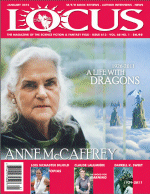Lois McMaster Bujold: Topias
 Lois McMaster Bujold was born in Columbus, Ohio. She began writing in 1982, and her first sale was short story ‘‘Barter’’ to Twilight Zone Magazine in 1985. Her notable short work includes Nebula finalist ‘‘Weatherman’’ (1990) and Hugo finalist ‘‘Winterfair Gifts’’ (2004). Some of her stories are collected in Dreamweaver’s Dilemma (1996).
Lois McMaster Bujold was born in Columbus, Ohio. She began writing in 1982, and her first sale was short story ‘‘Barter’’ to Twilight Zone Magazine in 1985. Her notable short work includes Nebula finalist ‘‘Weatherman’’ (1990) and Hugo finalist ‘‘Winterfair Gifts’’ (2004). Some of her stories are collected in Dreamweaver’s Dilemma (1996).
She launched her popular Miles Vorkosigan series in 1986 with Shards of Honor and The Warrior’s Apprentice, following with Brothers in Arms (1989), Hugo and Nebula Award-winning novella ‘‘The Mountains of Mourning’’ (1989), collection Borders of Infinity (1989), Hugo winner The Vor Game (1990), Hugo and Locus Award winners Barrayar (1991) and Mirror Dance (1994), Cetaganda (1995), Memory (1996), Komarr (1998), A Civil Campaign (1999), and Diplomatic Immunity (2002). She returned to the series with Hugo finalist Cryoburn (2010).
Her standalone novels include Ethan of Athos (1986), Nebula winner Falling Free (1988), and historical fantasy The Spirit Ring (1992). She began a new fantasy series with the Mythopoeic Award-winning The Curse of Chalion (2001), Hugo, Nebula, and Locus Award-winning Paladin of Souls (2003), and The Hallowed Hunt (2005). Her latest fantasy work is the Sharing Knife series, which includes Beguilement (2006), Legacy (2007), Passage (2008), and Horizon (2009). She edited anthology Women at War (1995) with Roland Green.
Bujold is divorced, with two adult children. She lives in Minneapolis.
Site: The Bujold Nexus
Excerpts from the interview:
‘‘People often ask me if writing science fiction is any different from writing fantasy. For me, they are a continuum: definitely science fiction on one end, fantasy on the other, and then there’s a muddy ground in the middle. Is faster-than-light travel fantasy or science fiction? Which is telepathy? Some stories treat magic rigorously, as though it were a science, bringing the machinery of science fiction to a different matrix. I suppose my touchstone is that if the supernatural is ‘‘real’’ in the story, it’s clearly fantasy.
‘‘But as I approach it, whatever the genre, the writing is the same. Characters almost always come first. Then the world assembles itself around them. I walk into a character’s head and wrap their life around me. They’re in the center of their own universe, and it extends out as far as they can see; that’s true for every character whose viewpoint I use. But the filters they bring to the story will be different, depending on their background.”
…
 ‘‘I had been thinking about the demographics of cryonics for a long time before I wrote Cryoburn. The idea was quite fascinating, but what if everybody wanted in on the act? It might help one or two of us, but what if it’s the entire population of 1912 pouring in upon us today, wanting our space? We just got this world – it’s our turn, pal! So there’s a demographic conflict, and a bunch of economic questions. To explore those ideas, I’d long thought that I would send Miles Vorkosigan off to a planet where they would have cryonics as an established technology, and let him discover all the ways things can go wrong and right and sideways.
‘‘I had been thinking about the demographics of cryonics for a long time before I wrote Cryoburn. The idea was quite fascinating, but what if everybody wanted in on the act? It might help one or two of us, but what if it’s the entire population of 1912 pouring in upon us today, wanting our space? We just got this world – it’s our turn, pal! So there’s a demographic conflict, and a bunch of economic questions. To explore those ideas, I’d long thought that I would send Miles Vorkosigan off to a planet where they would have cryonics as an established technology, and let him discover all the ways things can go wrong and right and sideways.
‘‘I don’t really write utopias or dystopias. I think I just write ‘topias’: worlds that have good points and bad points, in a mix. This time I was exploring death and themes of death. I had always thought Aral would die well before Miles was 40, but he won a reprieve when I sent him offstage, which allowed Miles to go into a more grown-up mode. Another element was autobiographical: the death of my own father, the shock and the thinking about all the many things we might have done differently. I wanted to share that experience with Miles, because it was the purest thing I knew about the deaths of fathers.”
…
 ‘‘I’ve been working on another Vorkosigan book about Ivan since November of 2009, but it was much interrupted by menopausal medical issues – basically, I lost most of 2010 and the first half of 2011. And that wasn’t the only problem. In December 2010, I took the trailing five chapters and dumped them, and rolled the book back to the mid-point where it had still felt right. Eventually I broke through to the key ideas, the ones which are obvious in retrospect but which I didn’t see in advance. Same characters, but a different location, made all the difference. All of a sudden, the story opened up. It all slotted in, thunk, in the last quarter of 2011, and is now done and turned in at Baen. 150,000 words, provisionally titled Captain Vorpatril’s Alliance, publication around November 2012; a book tour is threatened.
‘‘I’ve been working on another Vorkosigan book about Ivan since November of 2009, but it was much interrupted by menopausal medical issues – basically, I lost most of 2010 and the first half of 2011. And that wasn’t the only problem. In December 2010, I took the trailing five chapters and dumped them, and rolled the book back to the mid-point where it had still felt right. Eventually I broke through to the key ideas, the ones which are obvious in retrospect but which I didn’t see in advance. Same characters, but a different location, made all the difference. All of a sudden, the story opened up. It all slotted in, thunk, in the last quarter of 2011, and is now done and turned in at Baen. 150,000 words, provisionally titled Captain Vorpatril’s Alliance, publication around November 2012; a book tour is threatened.
…
‘‘I have no idea where my career is going next. I think I would like to do something new. The readers cannot have any expectations if I do something new. (They can still bitch that I’m not doing something old, but they can’t bitch that I’m doing the old thing wrong.) Maybe historical fantasy. In the historical part, technology and economics and whatnot are at least holding still, so you have a fighting chance to get your brain around it before it all changes out from under you.”






Pingback:SF Tidbits for 1/16/12 - SF Signal – A Speculative Fiction Blog
Pingback:Locus Online Perspectives » Lois McMaster Bujold: Topias | Hold Your Future